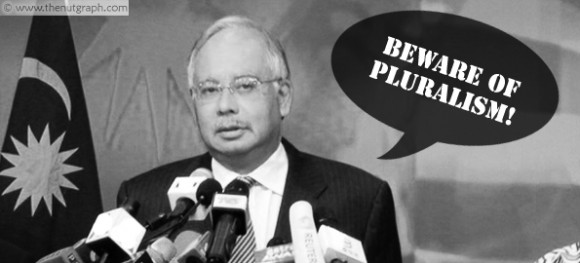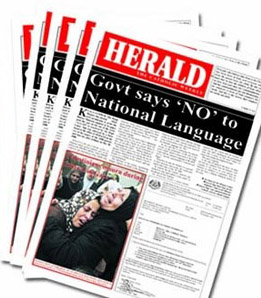WHAT’S wrong with a Muslim saying that religious pluralism is harmful to Muslims? Or for a believer of any faith to say that his or her religion is the true one? Or even for an atheist to be adamant that there is no God?
Nothing. As personal statements of belief, most persons of faith would say that their respective religion, or lack of one, is complete. As a privately held claim, and in line with Article 11 on the freedom of religion, thinking of one’s belief system as superior to others is a right of personal choice.
But is there a problem when a head of government warns citizens against religious pluralism, as Prime Minister Datuk Seri Najib Razak reportedly did on 18 Feb 2011? Was it just Najib exercising his right to a theological stand, as Malaysian Consultative Council of Buddhism, Christianity, Hinduism, Sikhism and Taoism (MCCBCHST) president Rev Thomas Phillipsasserted? In responding to Najib’s comments, Rev Phillips advised the public against taking Najib’s statement out of context.

However, it is precisely the Malaysian context that makes it problematic when something like this is said by the head of government. Malaysia is a pluralistic country, where policies and the implementation thereof are largely determined by people of a particular ethnic group and religion. Theological claims to religious exclusivity would not matter as much if all citizens were treated as equal before the law. Nor would it matter as much if politicians did not seek to use religion to divide people. But what really is the situation here?
Prioritising Islam
Najib may have been specifically addressing a meeting of religious teachers. When he said, “To say all religious are equal before Allah is against the Islamic belief”, it may well have been a personal theological opinion. He may also have been sincere in not insulting other religions, as he said.
But with a public delivery system that has been increasingly Islamised arguably from the time of Tun Dr Mahathir Mohamad’s leadership, was it responsible of Najib to make a statement that could be interpreted as placing Islam above other religions? How sure are we that the rest of his administration and his political cohorts wouldn’t interpret his words to mean that they must prioritise Islam in making decisions?
Intentionally or not, Najib may have merely helped to perpetuate an existing tendency of some politicians and bureaucrats to make decisions according to religious and also racial bias. These are just some examples that demonstrate existing bias in government decisions and actions, whether corporately by state apparatus or individually by their players:
 the Home Ministry’s ban of the use of “Allah” by Catholic weekly Herald, which has been pending appeal for over a year. Until the appeal is heard, the ban remains due to a stay of the High Court’s decision overturning the ban;
the Home Ministry’s ban of the use of “Allah” by Catholic weekly Herald, which has been pending appeal for over a year. Until the appeal is heard, the ban remains due to a stay of the High Court’s decision overturning the ban;
Lim
None less than a former minister, Tun Dr Lim Keng Yaik, told The Nut Graph in an interview of similar frustrations with civil servants during his time in the cabinet. Lim recounted an incident where a government officer blocked his directive for a sum of money to be allocated to a Chinese temple. The reason cited by the officer was that as a Muslim, he could not be aiding other religions. Lim also recalled officers who wanted to end the vernacular school system.
Doublespeak
Just how do some in the civil service become so zealous and powerful as to get away with the above examples? As Lim said in his interview: “unchecked … forced nationalism” based on the dominance of one race and religion. The work of BTN is also likely a contributing factor. And now, public remarks like that of Najib’s may only further entrench already narrow mindsets.
One reaction to all this is that Islam is, after all, the religion of the federation as enshrined in the Federal Constitution. But let us also recall what Malaysia‘s founders had in mind: that Islam’s status would not erode Malaysia’s position as a secular state. This historical fact was affirmed by the judiciary in 1988 – that Islam’s role in government was for rituals and ceremonial purposes and that Malaysia was not an Islamic state. There are of course, objections to this judicial decision, and today, one can see how far Malaysia has moved beyond its founders’ position.
As a non-Muslim, I won’t presume to tell Najib what he should have said instead when carrying out his official duty at the meeting of religious teachers. But I do wonder if our leaders from both sides of the divide at the very least think about the impact of their words on all communities.
Otherwise, it’s a joke, really, when Barisan Nasional leaders preach 1Malaysia, yet allow something poisonous like BTN to exist, and then scramble to do damage control when public delivery system implementers let slip their prejudices. And it’s a concern when the Pakatan Rakyat tries to sell its brand of equality when their leaders cannot yet confront their differences over the Islamic state issue, or fall back on communalism in attempts to beat political rivals.
Or maybe it’s not a joke after all. Unfortunately for Malaysia’s diverse peoples, ensuring communal politics has long been a strategic and expedient way to attain and stay in power. But it’s time Malaysians reject politicians who double-speak and use communal politics to their own benefit, to the detriment of the country’s harmony. - The Nut Graph

No comments:
Post a Comment